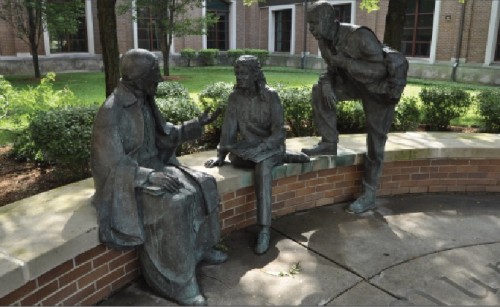
Despite being the largest Catholic university in the country, DePaul has come under criticism in some circles for not following strict Catholic doctrine. Some have posed the question of whether or not DePaul truly is a Catholic institution, given it’s sometimes progressive and liberal tendencies.
Institutions such as the conservative Catholic Cardinal Newman Society have, in recent years, criticized the university for its religious pluralism and its encouragement of student acceptance of the LGBTQ community.
This comes as millennials are changing the face of religion with both their acceptance and denial of faith. A recent Huffington Post study found that 25 percent of millennials identified as religiously unaffiliated. DePaul is no exception, as less than half of the undergraduate student population identifies as Catholic.
“I am not catholic in any way shape or form and I think there is some confusion about what Catholic means at DePaul,” Sarah Mitchell, a senior interning with DePaul’s service immersion program, said. “In its roots, Catholicism means that you believe in Jesus Christ and the resurrection but Catholicism is also this greater thing that speaks on morality, service and community, especially here on DePaul’s campus.”
Many students at DePaul who do not strongly identify as Catholic cling to the slogan, “DePaul is as Catholic as you want it to be.” While the slogan rings true, it has become problematic for some.
“Pope Francis is changing Catholic social teaching. There is this shift over how literally we are going to start taking things — we’re pushing for modern Catholicism especially because younger people want flexibility with specific rules,” Mitchell said. “Ultimately, I think that religion is something that we have to know about. Whether or not we follow a specific doctrine, religion shapes the way that we interact with other people. And whether or not you are a practicing Catholic, Catholicism has shaped our history, the way we are and the way our government is formed.”
DePaul advertises itself as an Urban, Catholic and Vincentian institution. This trinity is what many think keeps the university on its progressive track.
“On my first tour here at DePaul, I didn’t hear the word Catholic. Instead I heard Vincentian, and I think that’s what resonated the most with me,” Emma Mitchell, who lives in Vincent and Louise House, said. “I value social justice and service, and that is what DePaul encourages students to partake in through a Vincentian lens.”
DePaul’s Catholic teachings emphasize Vincentian service efforts and encourage aiding the community. Students are able to carry out these efforts in various pockets of marginalized groups because of the school’s urban location.
Chicago’s urban location allows students to explore the communities around them and search for opportunities to aid their growth.
“We talk a lot about identity,” Patrick Pfohl, vice president of Act Out DePaul, said. “We do a lot of dialogue and we are making efforts to get out into the streets and impact the community around us.”
Act Out holds an active presence on campus, and while their initiatives provide a community for LGBTQ students, some members of the Catholic community might struggle to identify how groups like Act Out can contribute to carrying out DePaul’s mission.
“The biggest part about being Vincentian is helping those who are on the margins of society and queer people are very much a marginalized group of people,” Pfohl said. “Act Out DePaul is focused on aiding these people and helping them affirm their identities. Providing them with a community space in a judgement free zone is very much Vincentian.”
Any tension that exists between the Catholic community and the queer community is of one’s own creation, Pfohl suggested.
“I think that a lot of people have issues with Catholicism and queer identity because they have had negative experiences in their own faith being shut down and told that who they are is not right,” he said. “To assume that Catholics and LGBTQA groups cannot intermingle is a wrong assumption because there are plenty of people that identify as queer and Catholic. They are able to intermingle because you are the creator of your own identity.”
Some students are challenging the core values of Catholicism and incorporating them into their individual missions to spark change in communities.
“Catholic literally means universal, and the term can be used in many different ways,” Allison Carvalho, a sophomore interning for the Vincentian Outreach office of Mission and Values, said. “It depends on the individual. People will use that term in different contexts and different light because to each person what they identify as Catholic depends on what their background with the faith is.”
In his address to incoming freshman, Rev. Dennis Holtschneider, C.M., encouraged students to see the world through a Vincentian lens.
“Ask yourself, ‘I wonder why the world is this way?’ St. Vincent DePaul was alive 400 years ago and he was looking at the world as it was changing around him and he was asking, ‘What does the world need?’ Here at DePaul we invite you to do the same,” Holtschneider said.

